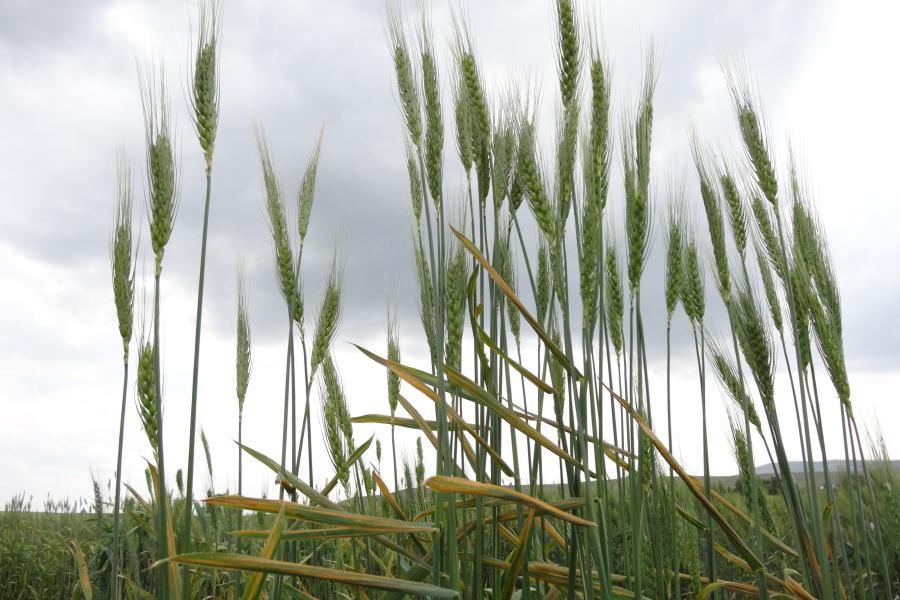Workshop, led by FAO, discusses strategy for wheat rust disease management in Tajikistan
26 June 2025
26 June 2025, Dushanbe – A national workshop reviewing the draft National Strategy and Contingency Plan for the prevention and management of wheat rust diseases in Tajikistan was held at Tajik Agrarian University named after Shirinsho Shotemur. The event brought together plant protection specialists, government officials, scientists, and other key agricultural stakeholders to evaluate and refine the national response to wheat rust diseases.

Organized by the Food and Agriculture Organization of the United Nations (FAO), the workshop was supported by the FAO–Türkiye Partnership Programme (FTPP). The workshop formed part of the ongoing CACRust project (Strengthening Regional Collaboration and National Capacities for Management of Wheat Rust Diseases and Resistance Breeding in Central Asia and Caucasus), a regional initiative aiming to reduce the impact of rust diseases, particularly stripe, leaf, and stem rust, which continue to pose a serious threat to wheat yields and livelihoods across Central Asia and the Caucasus.
Wheat rusts are fast-evolving fungal diseases with high epidemic potential. In Tajikistan, where wheat is a staple crop and a cornerstone of national food security, developing a coordinated national approach to address these threats is essential.
Participants reviewed the structure and content of the draft National Strategy and Contingency Plan for the prevention and management of wheat rust diseases. They focused on the status of wheat rusts in Tajikistan, and existing management efforts. They also discussed the emergency and rapid response plan for the early detection, reporting and containment of rust outbreaks.
The participants emphasized the importance of multi-stakeholder engagement, cross-border collaboration, and knowledge exchange in tackling rust outbreaks. The discussions also reinforced the need for continued investment in research, surveillance, seed production, variety resistance, and farmer training.
'Wheat rust diseases pose an increasing transboundary threat that requires a coordinated, science-based response. This workshop has laid the foundation for a robust national strategy that is anchored in evidence, driven by collaboration and focused on safeguarding productivity and resilience. Through the FAO–Türkiye Partnership Programme and the CACRust project, FAO supports Tajikistan’s efforts to strengthen resilience and protect wheat production,” said Aghasi Harutyunyan, FAO Representative a.i. in Tajikistan.
The outcomes of this workshop will guide the finalization of the National Strategy, enhancing Tajikistan’s capacity to prevent and respond to wheat rust outbreaks and strengthening the resilience of its agricultural sector.
About the FAO-Türkiye Partnership Programmes
The objectives of the FAO-Türkiye Partnership Programmes are to provide support to ensure food security, rural poverty reduction, and sustainable forest management; combat desertification; and preserve ecosystems in Azerbaijan, Kazakhstan, Kyrgyzstan, Tajikistan, Türkiye, Turkmenistan and Uzbekistan, and other countries of mutual interest.
Established in 2007, the first phase of the FAO-Türkiye Partnership Programme on Food and Agriculture (FTPP) benefited from trust fund contributions totaling USD 10 million, financed by the Government of Türkiye and represented by the Ministry of Agriculture and Forestry. During the first phase of the programme, 28 projects were implemented in 16 countries between 2009 and 2015.
In 2014, Türkiye and FAO commenced the second phase of the FTPP along with the first phase of the FAO-Türkiye Forestry Partnership Programme (FTFP) with additional funding of USD 20 million, bringing Türkiye’s total contribution to USD 30 million.

